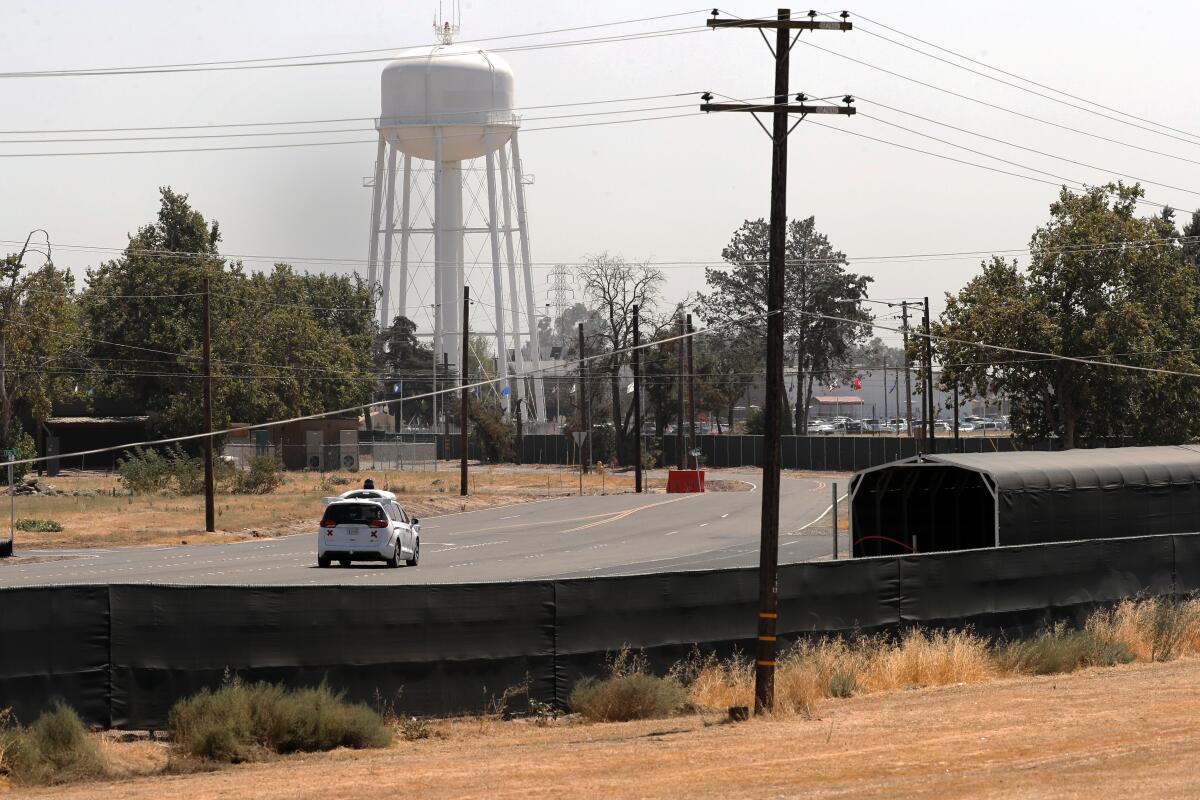
When the federal government closed Castle Air Force Base in Merced County in the 1990s, the dilapidated buildings and vast expanse of aging tarmac left behind seemed more like a liability than an opportunity.
But in 2018, the old runways that once carried B-52 bombers found an unexpected new customer: Google, which was testing its experimental autonomous vehicles there, away from the prying eyes of Silicon Valley.
At the urging of then-state Rep. Adam Gray, California gave Merced County $6.5 million that year to expand the self-driving testing program at the former base.
A few years later, Gray also invested there.
In 2022, a company in which Gray is a minority shareholder bought four apartment buildings on the former Merced County base, according to a Times review of Gray’s business records, land records and financial disclosures. Gray’s connection to the real estate deal has not been previously reported.
The sale closed for $600,000 in August 2022, records show, and the property is now valued at more than $2.5 million. Gray’s representatives said the investment demonstrates his interest in providing affordable housing and that the renovations were so costly that he has yet to make any money.
Still, the real estate deal in rural Atwater, Calif., is under scrutiny as Gray, a Democrat, fights to unseat first-term Rep. John Duarte (R-Modesto). The race in California’s 13th Congressional District is a bitter rematch from 2022, when Duarte beat Gray by the second-closest margin in the country: 564 votes.
The race is among a handful of contests across the United States that are considered crucial to determining which party will control Congress after the November elections.
Republicans have questioned the timing of Gray’s purchase, which closed four months before he left the legislature and less than a year before California officials allocated nearly $50 million in new funding for the site. The 2023 grant from the California State Transportation Agency helped Merced County build a rail hub at the base site to handle freight loaded onto trains from the ports of Long Beach and Los Angeles.
“Gray’s selfish plan reveals his true nature as a Sacramento politician who lines his own pockets at the expense of Valley families’ trust and hard-earned dollars,” said Ben Petersen, a spokesman for the National Republican Congressional Committee, which works to elect Republicans to the House of Representatives.
Petersen accused Gray of “mixing taxpayers’ money with personal profit” and said the apartment deal should be investigated.
Far from lining his pockets, according to his campaign and company, the former Castle Air Force Base apartments required so much renovation that Gray actually lost money.
Ben Rodriguez, Gray’s campaign manager, said the allegations were false and “aimed at distracting voters from John Duarte’s disastrous record.”
“While Adam Gray brought real help to families in this district, Duarte makes families worse off every day he is in Congress,” Rodriguez said.
Gray is a minority shareholder in Gemenii LLC, the company that owns the base’s apartment complex. Gemenii is a subsidiary of a family-owned residential and commercial construction company of which Gray is also a member, the company said.
Gray learned about the Castle Air Force Base apartments about six months before the sale, when “partners who own other properties in Castle” approached him with the idea of renovating the 80-unit complex to provide affordable housing, the company said.
The four spartan buildings, which once housed barracks for airmen, were in disrepair and three of them were vacant. Merced County had classified the property as surplus and valued the buildings and the 5.3 acres of land below them at between $400,000 and $600,000, the company said.
When the county received “no other competitive offers,” the firm said, Merced County sold the buildings for $600,000.
The company has since spent millions on renovations, “exactly as Merced County intended when the property was sold in an open and public sale process,” company attorney Richard Marchini said in a written statement.
Gray still represented the Modesto area in the state Assembly when the sale was completed.

A Google Waymo autonomous vehicle navigates the roads inside the company’s facility on the property of the former Castle Air Force Base, now a municipal airport, in Atwater, California, in 2017.
(San Francisco Chronicle/Hearst Newspapers via Getty Images)
Gray owns a 30 percent stake in the company that owns the apartments, the company said. His name does not appear in official company documents.
Gray first disclosed his investment in his 2022 Form 700, the financial disclosure that California lawmakers are required to file annually with state ethics officials.
Government experts said it did not appear that Gray’s real estate deal broke the law.
But, they added, elected officials who invest in real estate must be aware of the potential for conflicts of interest, particularly when investing in their constituencies.
Dan Schnur, former director of the California Fair Political Practices Commission, said Gray’s real estate investment at the site, limited by the allocation of taxpayer funds, seemed “suspicious.”
“Everyone deserves the benefit of the doubt, but the best way to get it is to earn it,” Schnur said. “A public servant has to be aware of how these things can be perceived.”
After losing his 2022 congressional campaign, Gray filed a federal financial disclosure with the House in which he failed to disclose the real estate investment or his stake in the LLC that owns the buildings.
His campaign said Gray did not mention the investment in the apartment complex because there was no income to report, but he did disclose his position in the parent company.
In a new filing made public this month for Gray’s second run for Congress, he said he would receive between $100,000 and $1 million from the LLC that owns the apartments in 2023, and between $50,000 and $100,000 in the first half of 2024.
These figures represent the company’s total revenue, rather than Gray’s, and were mentioned “out of an abundance of caution,” the campaign said.
Gray received no revenue from the business in 2023 or 2024, the campaign said, and the investment did not generate a profit.
The former air force base, now called Castle Commerce Center, covers about 3 square miles. It is home to miles of empty roads and dozens of private and government tenants, including a federal prison, a post office, Merced’s commercial airport and Waymo, Google’s self-driving car company.
After Gray helped secure the $6.5 million grant for the self-driving car test site in 2018, Merced County converted vast stretches of unused tarmac at the base into a testing center. There are now full intersections with traffic lights and signalization and a 2.2-mile test highway with entrance and exit ramps where vehicles can practice urban driving.
The site, operated by an Ohio-based company, has hosted two dozen Silicon Valley companies and major automakers.
Amid that boom, Merced County supervisors continued to sell off portions of the base as surplus land. That included the 5.3-acre site and the 80-unit apartment complex, which the board sold by a 4-0 vote in May 2022 to Gemenii.
At the time of the sale, the land was valued at $465,000 and the structures at $135,000, according to tax records provided by the company.
The company took out a 30-year, $885,000 mortgage in late 2022, and a 15-year, $3 million mortgage in June of this year, to finance the building renovations, the company said.
Two buildings have been gutted and renovated so far, a process that includes removing asbestos and replacing windows and appliances, the company said.
The renovated buildings are now valued at more than $2 million, while the value of the underlying land has increased by $9,300, according to tax invoices provided by the company.
The increase in value is “directly related to Gemenii’s material financial efforts to revitalize the property,” the company said. Any developments at the air base site, the company said, “had no impact on the value of the property.”

